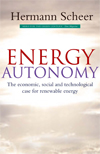 EUROSOLAR Press Release, Prague/Bonn/Brussels, February 14th, 2006
EUROSOLAR Press Release, Prague/Bonn/Brussels, February 14th, 2006EUROSOLAR, WWEA, EREF, and Nova Energie welcome the announcement by the European Commission to carry out an extensive follow-up of the implementation of the directive for renewable energy electricity in all Member States – European Commission has already started an examination of the lack of transposition of the directive in the Czech Republic.
Prague/Bonn/Brussels – The European Commission announced at a renewable energy conference at the Czech Senate in Prague recently that it is reviewing the Czech renewable energy legislation concerning the deficient implementation of the directive on renewable energy electricity (2001/77/EC). Until now, the European Commission considers the new Czech Act (180/2005 Coll) only a formal introduction to the transposition of the Directive.
WWEA, EREF, Eurosolar and Nova Energie welcome this step – which follows a letter of the organisations to the Czech Prime Minister of last May – as an important signal that the European Union sees renewable energies as a basic component of the future EU energy supply.
The EU Commission worries the lack of secondary legislation in the Czech act and the lack of a reliable system of guarantee of origin. Also, the Commission states that the lack of long-term perspective in the setting of the feed-in tariffs creates investment insecurity and that grid access and administrative procedures are not sufficiently dealt with. In addition, renewable electricity according to the Czech act shall cover grid losses, and therefore supported renewable electricity is hindered from reaching the market. According to Ms Beatriz Yordi the European Commission is also reviewing the national renewable energy legislation in other EU member states.
Czech Senator Martin Mejstrik comments on the statement by the EU Commission: “Two conclusions are of fundamental importance: First, almost two years have passed since the EU accession of the new member states and the time for their protection is over now. Secondly, we have become part of the group of states which will have to optimise their renewable energy legislation. This demonstrates the fundamental and increasing importance of renewable energies for the future energy supply of the European Union.”
Dr Hermann Scheer, President of EUROSOLAR and Member of the German Parliament: “In the future Europe will have to provide its energy completely from renewable sources. Therefore it is important that all European countries implement effective renewable energy legislation, based on the experiences gained in the most successful countries such as in the past Denmark and today Spain, or my home country, Germany. Countries that set up today only ambiguous renewable energy laws, which create major insecurities without giving real support to renewable energy deployment, will fall back and will lose out on huge economic and social opportunities.”
Dr Neela Winkelmann, Director of the Czech organisation Nova energie: “We feel very satisfied that the European Commission takes up the critical points that we raised in a joint letter to the Czech Prime Minister last year. Now the Commission says that the Czech government has to do more for boosting the renewable energy sector in our country – many, mainly small and medium sized emerging companies in the Czech renewables industry will see this as a great encouragement.”
Stefan Gsänger, Secretary General of the World Wind Energy Association: “The step by the European Commission is an important signal which goes far beyond the Czech Republic and even the European Union. It underlines the urgency, which is required to rid us of our dependency on limited and polluting energy sources such as oil, coal, gas or uranium. Political decision-makers around the world will see the EU action in favour of renewable energy as a signal to re-think the priorities in energy policies. Renewable energies have to be recognised as the only long-term option for a sufficient and sustainable energy supply.”
Dr Dörte Fouquet, Director of EREF, points out: “In EREF’s view this investigation opens the path towards establishment of fairness for the renewables sector in the Czech energy market. We hope it will assist the Czech government in reviewing their current policy and in putting itself in a position to reach its renewable energy targets in line with its commitment under the EU directive for renewable energy electricity.”



